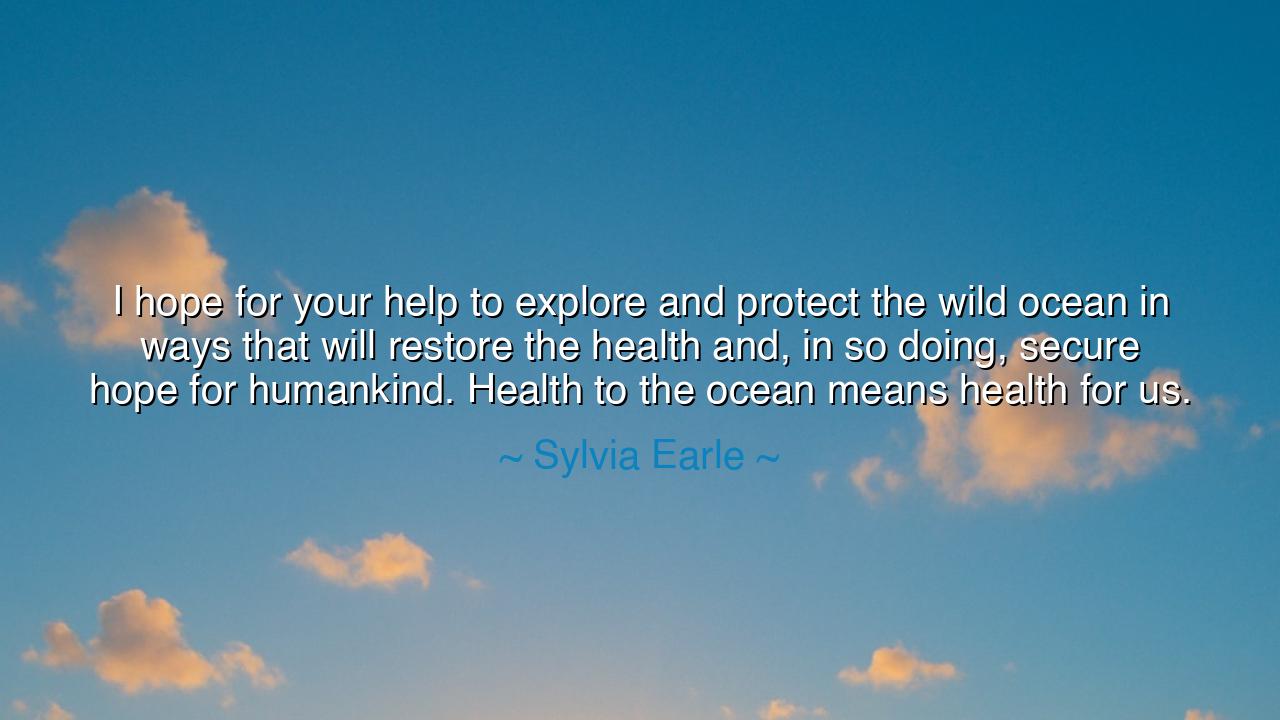
I hope for your help to explore and protect the wild ocean in
I hope for your help to explore and protect the wild ocean in ways that will restore the health and, in so doing, secure hope for humankind. Health to the ocean means health for us.






In the voice of Sylvia Earle, the guardian of the blue planet and explorer of the deep, there resounds a plea that transcends science and becomes sacred: “I hope for your help to explore and protect the wild ocean in ways that will restore the health and, in so doing, secure hope for humankind. Health to the ocean means health for us. These words are more than a call to action—they are a prophecy and a prayer. For the ocean, vast and ancient, is not merely water and wave, but the living heart of the Earth itself. To save it is to save ourselves. To neglect it is to wound the very pulse of life.
Since the dawn of creation, the sea has been our mother. From her depths arose the first breath of life, the earliest forms that crawled from her embrace to populate the land. She has cradled every generation since, giving us rain, food, and the breath we draw. Yet in our age of steel and smoke, humankind has turned its back on her grace. We take her gifts but poison her depths; we ride upon her surface but forget her soul. And so, Earle’s words emerge as a lament and a reminder—that our fate is tied to hers, that the ocean’s wounds are our own, and that the healing of the waters is the healing of humanity.
In her life, Sylvia Earle has ventured where few have gone—into the dark silence of the deep, where light fades and life takes forms of mystery and wonder. She has seen the fragile coral forests, radiant with color, now bleached by heat and greed. She has swum among the giants of the sea—whales whose songs once filled the oceans but now grow fewer each year. From these depths, she speaks not with despair, but with hope: that through exploration and protection, through knowledge joined with reverence, we may yet turn the tide. Her words carry the weight of the elder who has seen the sickness of the world and offers the cure.
The ancient mariners once worshiped the sea as divine, for they knew its power and its mystery. When the Greek sailors set forth upon uncharted waters, they made offerings to Poseidon, not from superstition alone but from respect. They understood that to survive, one must honor the sea’s might. In this, they were wise beyond their age. Today, science confirms what myth once whispered—that the ocean governs all life. Its currents regulate the climate; its plankton forge the air we breathe; its depths cradle the carbon that tempers our world. The ancients bowed in awe; we must bow once more—not in fear, but in responsibility.
Yet humanity has grown arrogant. We dredge, drill, and discard, believing the ocean infinite. But the truth is otherwise. Once, the cod fisheries of Newfoundland teemed with life—millions of fish that sustained families for generations. Then came greed, and overfishing turned abundance into emptiness. The seas fell silent where boats once brimmed with harvest. Only after the ruin did the people learn what Earle now proclaims: that the balance of the sea is fragile, that its gifts are not eternal unless guarded with care. Such stories are not tales of the past—they are warnings for the future.
“Health to the ocean means health for us.” In those words lies the essence of interdependence. The ocean’s breath fills our lungs; its bounty feeds our bodies; its beauty nourishes our spirits. When it thrives, we flourish. When it falters, we fall ill. This truth is as old as time, yet forgotten in the noise of progress. To heed Earle’s call is to remember that we are not masters of the Earth, but children of it—bound by the same laws, sustained by the same breath. The restoration of the ocean is not charity; it is survival, born from wisdom.
The lesson, then, is clear and sacred: to protect the ocean is to protect life itself. Explore, but not to conquer. Use, but not to exhaust. Let each of us become stewards of the deep—consuming less, preserving more, supporting those who heal rather than harm. Let every choice, from the food we eat to the plastic we refuse, become a small act of restoration. For the strength of the ocean is the strength of humanity, and to give back to her is to give back to our own future.
And so, let these words of Sylvia Earle echo through the generations: “Health to the ocean means health for us.” May we carry them as a mantra, as a vow. Let us rise like the tides to defend the waters that gave us life. For the sea remembers; she forgives slowly but rewards deeply. When we honor her, she sustains us. When we heal her, she heals us in return. Thus, to serve the ocean is to serve all creation—and through that service, to rediscover the hope that binds humankind to the eternal rhythm of the living world.






AAdministratorAdministrator
Welcome, honored guests. Please leave a comment, we will respond soon